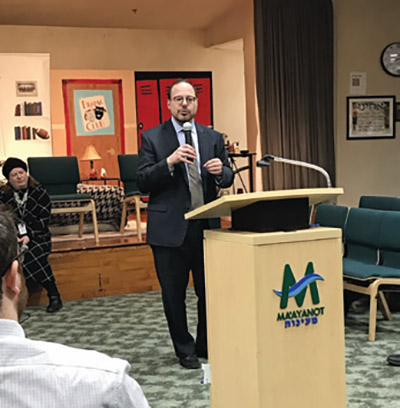



Editor’s note: To read this week’s Jewish Link editorial on this topic, please click here.
On Wednesday, December 27, members of the Jewish community of Bergen County gathered at Ma’ayanot Yeshiva High School for Girls for an interactive program that addressed the dangers of drug and alcohol use by teenagers and adolescents. The program, which was also sponsored by TABC and the Bergen County Prevention Coalition (BCPC), was called Hidden in Plain Sight and featured a recreated teenager’s bedroom through which the roughly 100 attendees could search for planted drugs, alcohol and other related paraphernalia. Speakers for the night included TABC’s Rabbi Steven Finkelstein and BCPC’s Director of Coalition & Community Services Shelley Stuart. An open question-and-answer forum with a panel comprised of experts from the community followed the speakers.
Kicking off the night was the interactive aspect of the program. Hidden In Plain Sight has a theme that things “may not be what they seem.” Fittingly, the teenager’s room may look normal upon first glance, but without a second one a parent may miss out on the vodka bottle hidden in a shoebox or the books concealing marijuana between the pages. The recreated room had an assortment of things for parents to find, some of which required creative thinking to discover, such as the modified soda bottles that hid alcohol. For many of the attendees, this aspect of the program was truly eye-opening.
Following the walk-around were the speakers, though parents did have a chance to return for additional searches after the question-and-answer forum. Rabbi Finkelstein and Stuart both discussed the ongoing issues the community has been dealing with regarding drugs and alcohol in teens and adolescents, though the latter used much of her time to introduce parents to newer advances that allow people to get high, such as electronic cigarettes (more commonly known as vapes). Stuart explained that she was glad that so many people had turned out to learn more about this very important topic and issue.
The panel for the question-and-answer forum consisted of Dr. Matis Shulman, Rabbi Scott Freedman, Dr. Rayzel Yaish and Dr. Oshra Cohen. Rabbi Finkelstein and Stuart occasionally also jumped in to share their opinions on certain matters. Responding to questions from the audience along with ones submitted anonymously, the group shared insight into how they would deal with certain situations. One interesting point about which many parents had thoughts regarded the problems with devices such as vapes, which are advertised as being much less dangerous than cigarettes. Responding to parents’ concerns, Rabbi Finkelstein stressed nicotine addiction’s slippery slope. While it may not be as dangerous as other means of getting high, it can lead to other things, resulting in poor decisions that can have lasting results that will affect the rest of one’s life.
The event’s reception by the attendees was mainly positive. While some had questions regarding how to deal with this issue should they discover their child beginning to experiment, the panel contended that the underlying notion that parents should take from the event is the importance of having an open line of communication. Just sitting down and having a proper conversation with their children can really help in making them feel more comfortable, able and willing to come forward and start a dialogue about problems in the future, even beyond drugs and alcohol. Otherwise children may just be internalizing their conflicts.
One local yeshiva father, who requested to remain anonymous, commented, “If you are not part of the solution, you are part of the problem. Parents need to be actively, rather than passively, involved, not just for their own children, but for other children and the community as a whole.”
He continued, “Something must be done proactively to keep these issues from getting worse. Right now, parents and the schools are behaving reactively.”
“We as Orthodox Jews are being drawn into the moral system of an amoral society. Based upon Orthodoxy’s higher moral code, drugs, alcohol, vapes, marijuana, just shouldn’t exist. The concept of higher morality is not, unfortunately, ingrained in the minds of the current generation,” he added.
BCPC is described as “a collaboration of individuals and organizations that are committed to, and passionate about, reducing the rates of alcohol and drug use among youth and youth adults in Bergen County.” Their website features an assortment of resources and initiatives that the organization is running to help promote healthy and safe living among the communities’ youth. Additionally, they also hold membership meetings on the third Thursday of every month between 10 a.m. and 11:30 a.m. in The Ciarco Learning Center in Hackensack. For those over 21, BCPC runs Sticker Shock, a community awareness program. Intended to steer adults away from giving alcohol to minors, it entails those involved visiting partnered liquor stores as part of events and placing stickers, bottle hangers and window notices with information including the penalties for committing this crime. It’s described as “a great opportunity for community groups, faith-based groups, school-based programs or any group interested in preventing underage drinking.”
“It is a daily burden, a responsibility and a privilege to care for our children, and this is true until the day we die. We must all take it seriously,” the father concluded.
By Adam Samuel
Adam Samuel is a journalist from Teaneck. When he isn’t busy reading the daily news, he divides his time between managing his blog, adamssoapbox.blog, and gradually learning how to play piano.










